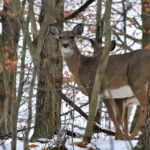Railroad companies have been notoriously arrogant and petty toward commoners the past 160-plus years, even as state and federal governments gifted them cheap easements, tax breaks and outright land grants to run their railways and deafening trains through our pastures, backyards and public lands.
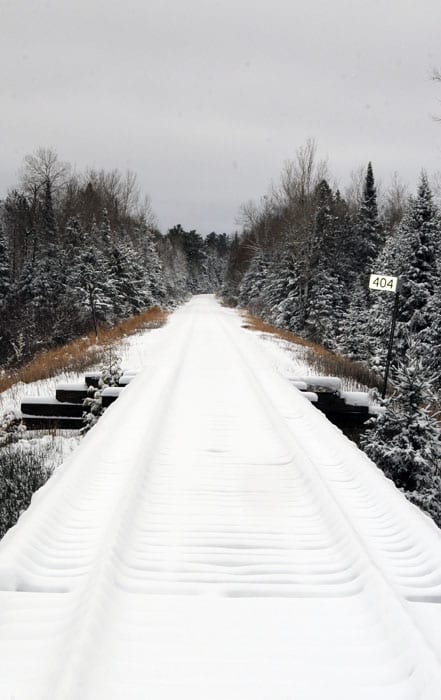
A Wisconsin law quietly passed in 2005 prohibits anyone from walking across railroad tracks unless they’re in a designated crossing area.
Hey, they’re the railroad and they’re hauling the nation’s freight. It’s commerce. Buck up if they wake the dead with their horns at 2 a.m., or block your road or driveway for a half-day while switching cars, crews or engineers.
Therefore, few Wisconsinites were shocked in early March when the state Senate’s Judiciary and Public Safety Committee ignored a bill to let people once again legally cross railroad tracks on foot to reach hunting, fishing and trapping sites statewide. Similar restrictions have been enacted in other Great Lakes states in recent years, but it’s fair to say not many bowhunters realized they were breaking a law by crossing train tracks outside of “designated crossings.” But yes, it’s been illegal in Wisconsin since 2005, when railroad interests quietly persuaded state lawmakers to forbid “trespassing” on their tracks.
Nonsense Decisions
Wisconsin sportsmen thought they were rid of this nonsense in June 2015 when the Legislature inserted language into the state’s 2015-17 budget to let people walk “directly across the tracks of any
Unfortunately, Gov. Scott Walker rejected the change, writing: “I am vetoing this section because I am concerned that allowing people to walk across railroad tracks outside of a designated crossing impairs public safety.”
And who says politicians have no sense of humor? Maybe Gov. Walker was inspired by Mark Twain, who wrote in 1871: “The railroads kill (300 passengers a year, while) 987,631 corpses die naturally in their beds! You will excuse me from taking any more chances. The railroads are good enough for me.”
Perhaps we shouldn’t question the governor’s sincerity, but if he thinks people crossing open railroad
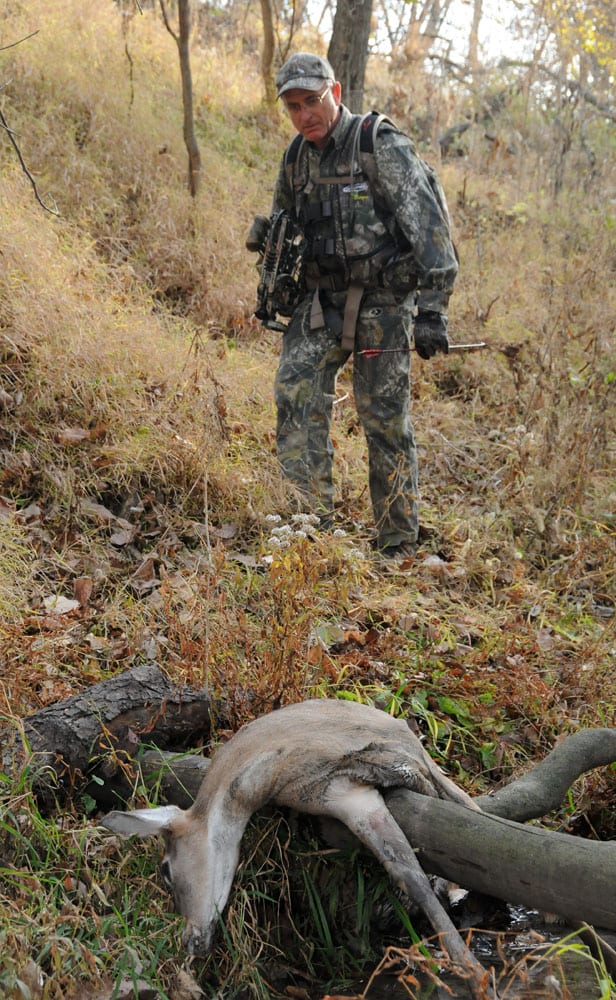
If you shoot a deer on your own property in Wisconsin and it runs across a railroad track to the other side of your land, you’re technically breaking the law if you walk across the tracks to retrieve it.
tracks on foot is too risky, where was he in 2014-15 when the Wood County Sheriff’s Department in central Wisconsin documented 141 cases of unreasonable blockages by Canadian National trains in the village of Auburndale alone?
Such blockages in central Wisconsin and elsewhere often cut people off from their homes, driveways and access roads, causing them to scurry between and beneath the parked train cars to reach school or doctor appointments.
Within three months of Walker’s July 2015 veto, Republican and Democratic lawmakers resumed efforts to rescind the railroad trespass law. In February, the Assembly passed AB-876, its version of the bill, 59-34. Folks assumed the Senate’s version, SB-734, would enjoy similar support, but Sen. Van Wanggaard, R-Racine, let it die in his office by never adding it to his Public Safety Committee’s agenda.
Among the Assembly bill’s co-authors was Rep. Joel Kleefisch, R-Oconomowoc, who commonly refers to it as a “sportsmen’s rights bill.” Kleefisch said the railroad trespass law forbids Wisconsinites from exercising their constitutional right to hunt, fish and trap by blocking access to private and public lands they’re entitled to hunt.
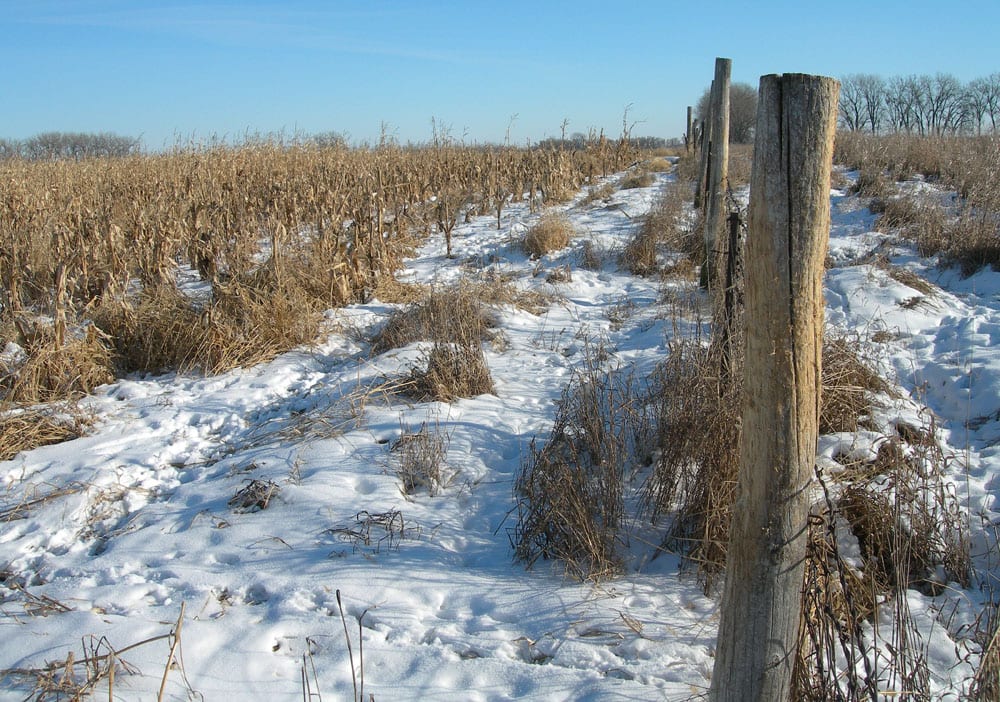
Railroad companies consider their railways to be fences, which effectively cuts off hundreds of miles of public-lands access in Wisconsin.
“I’m extremely disappointed,” Kleefisch said. “I’m afraid special interests got to the Senate. Fear tactics from the railroads affected their logic.”
Kleefisch also said he “strongly intends to come back immediately in the next legislative session with a bill that allows men and women to directly cross railroad tracks to access woods and waters to hunt and fish.”
Railroad Bullies
Interesting stuff, eh? After the railroad trespass law took effect 11 years ago, it mostly went unnoticed. But the past couple of years the Burlington Northern Santa Fe Railway has patrolled its 214 miles of tracks bordering the Mississippi River to run off anglers and hunters who dared cross. They apparently
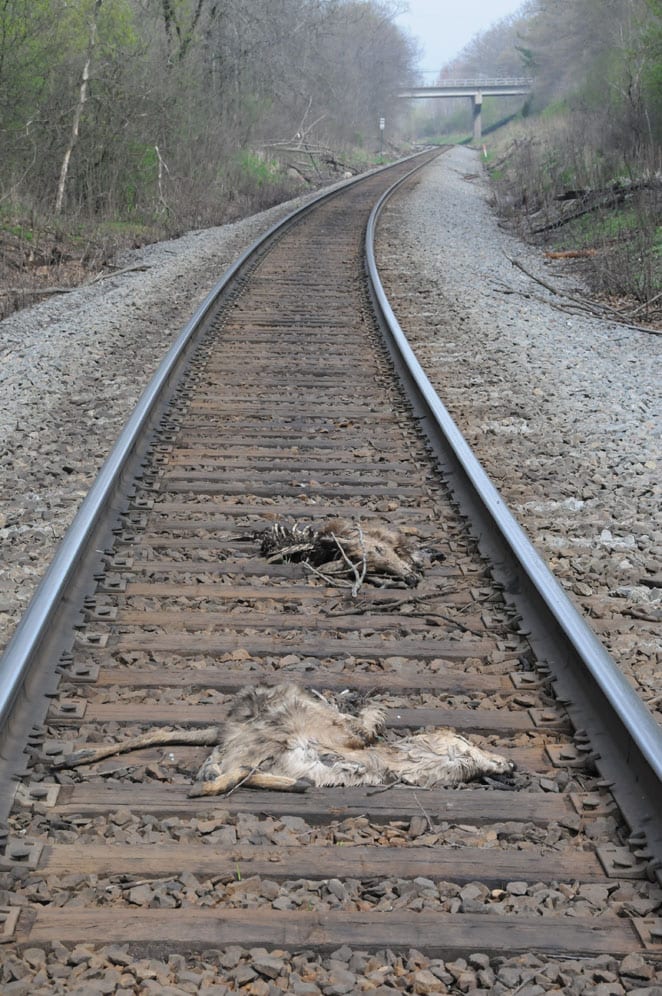
Unlike deer and other wildlife, few people die while crossing railroad tracks in the United States.
didn’t care that many of these folks were walking from paved parking lots the state built for fishing/hunting access to public lands between the railroad tracks and the river.
George Meyer, executive director of the Wisconsin Wildlife Federation, reminds people the current law applies statewide. In fact, the Department of Natural Resources compiled a list of 121 DNR properties bisected by railroad tracks. So, if you shoot a deer and it runs to the far side of the tracks before dying, you could be cited for trespassing if you retrieve it.
Meyer also reminds people that a railroad track cuts through Devil’s Lake State Park near Baraboo. It’s one of Wisconsin’s most popular public properties. “I’m sure at least 100,000 people cross those tracks each year, and I doubt more than a couple of them realize they’re breaking the law,” Meyer said.
Kleefisch thinks railroad safety concerns are exaggerated, noting that most train fatalities involve motor vehicles, drunken drivers or suicides. Even so, train-caused fatalities today are still less than they were in Mark Twain’s era. According to the Federal Railroad Administration, 264 people died nationwide in train-crossing accidents in 2014, the most recent data available. Of those, 16 were in Wisconsin. And from 2005 and 2014, the national annual average was 284 fatalities.
For comparison, 193 Americans died when striking deer with motor vehicles in 2013. And in Wisconsin the past five years, ATV fatalities averaged 20 annually, while boating averaged 17 and snowmobiles 14.
And besides the fear tactics, where do railroad companies get off banning the public from crossing “their” tracks? In Wisconsin, “the people” gave them most of those right-of-way lands between 1852 and 1875 to promote commerce. In exchange, railroads don’t pay property taxes.
Instead, they pay an “ad valorem” tax as a public utility, the same as pipelines, telephone companies, and power-and-light utilities. Of the total $424.42 million paid by Wisconsin’s ad valorem taxpayers in in 2015, railroads accounted for $35.66 million, or 8.4 percent of the total.
You’d think the railroads would have better things to do than harass people simply trying to hunt and fish on lands set aside for their use and enjoyment.
And you’d assume lawmakers and governors would tell the railroads where to go when they demand even more charity and tolerance from a public they’ve long disregarded.

 By
By 


